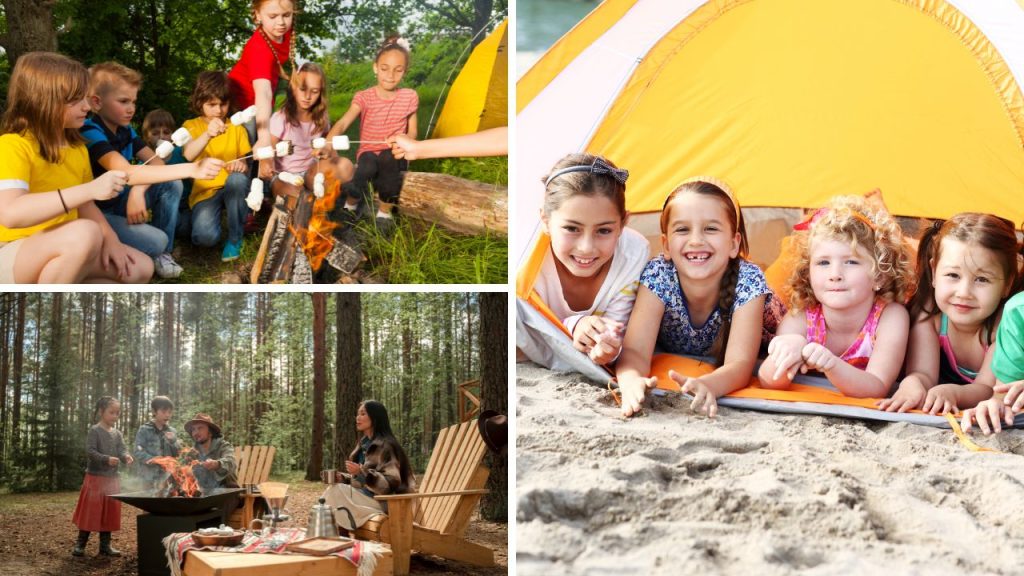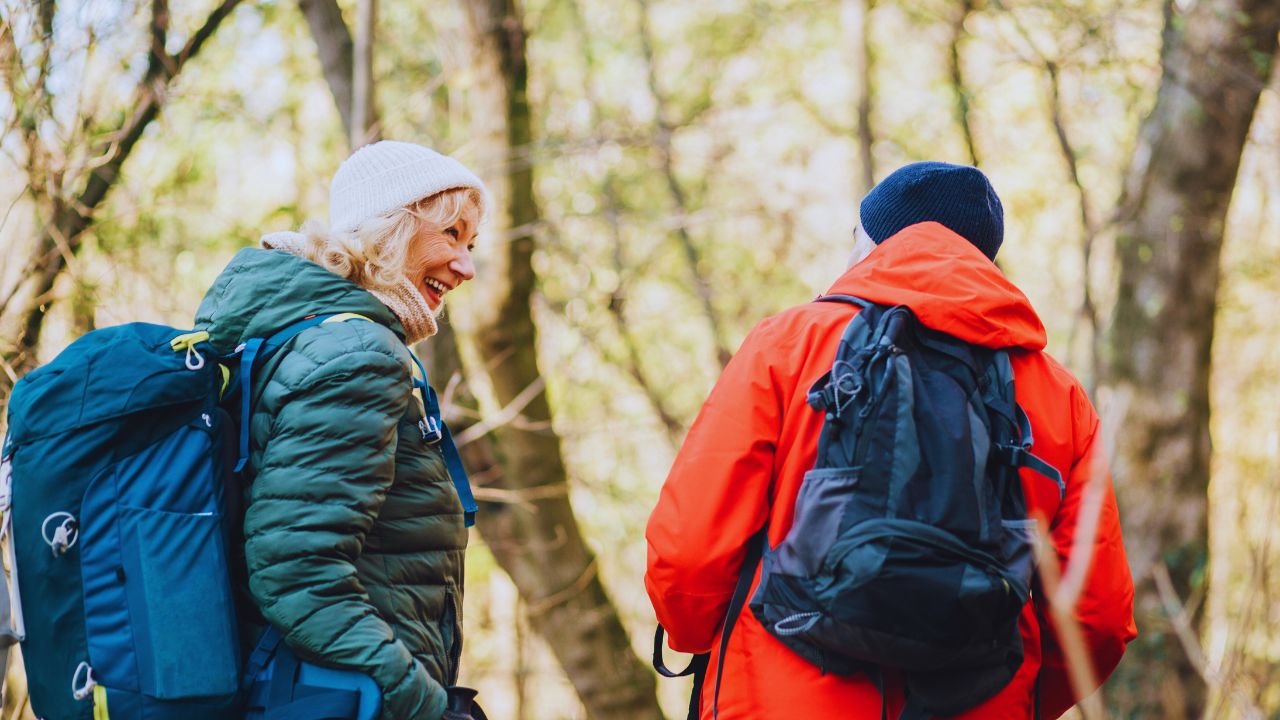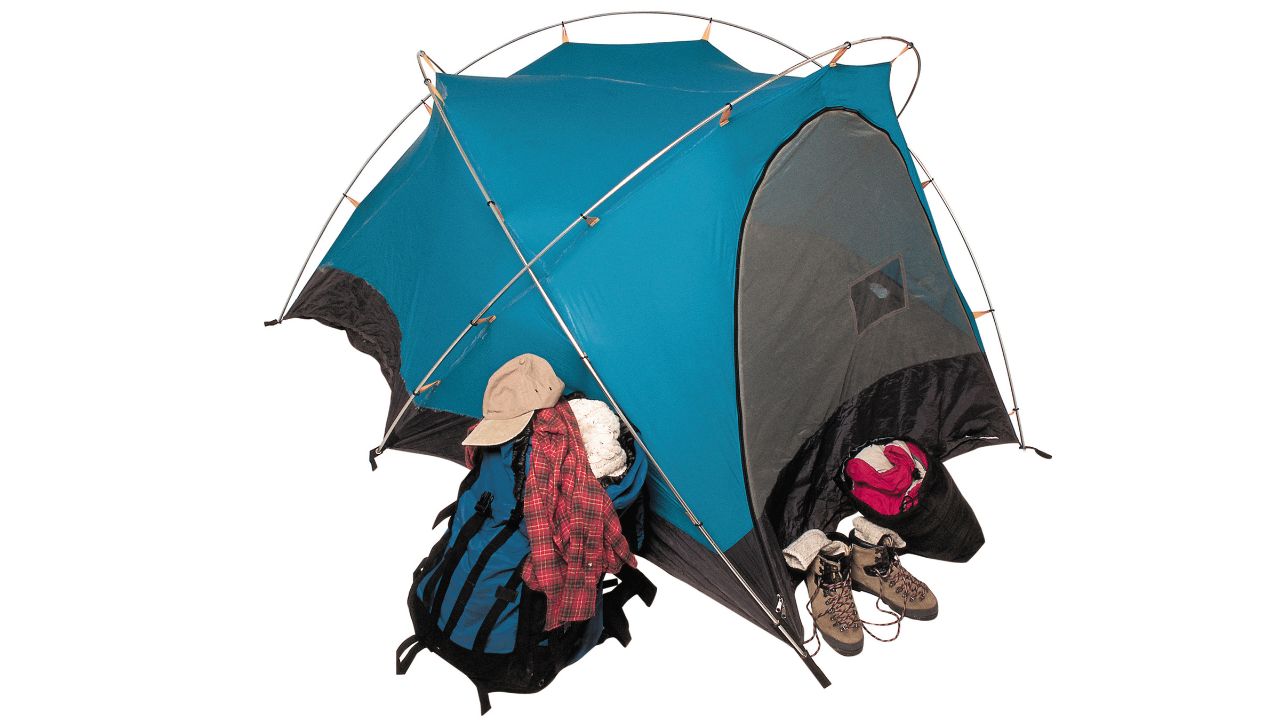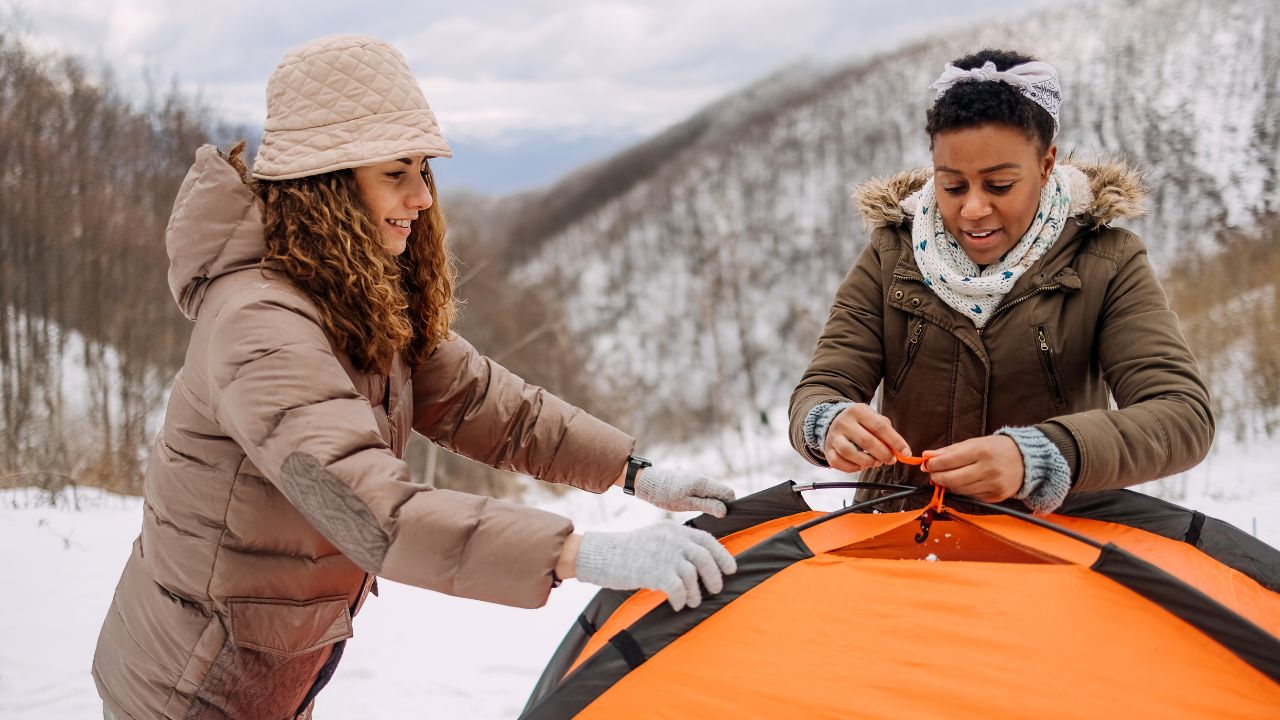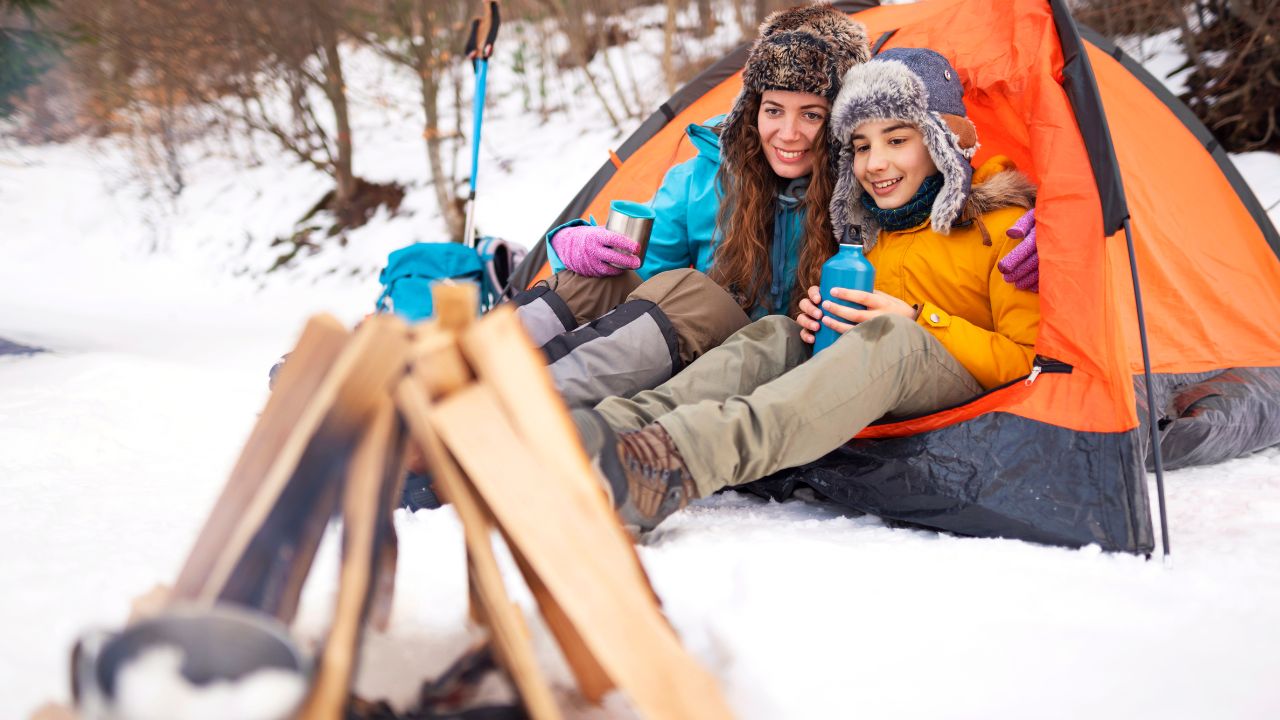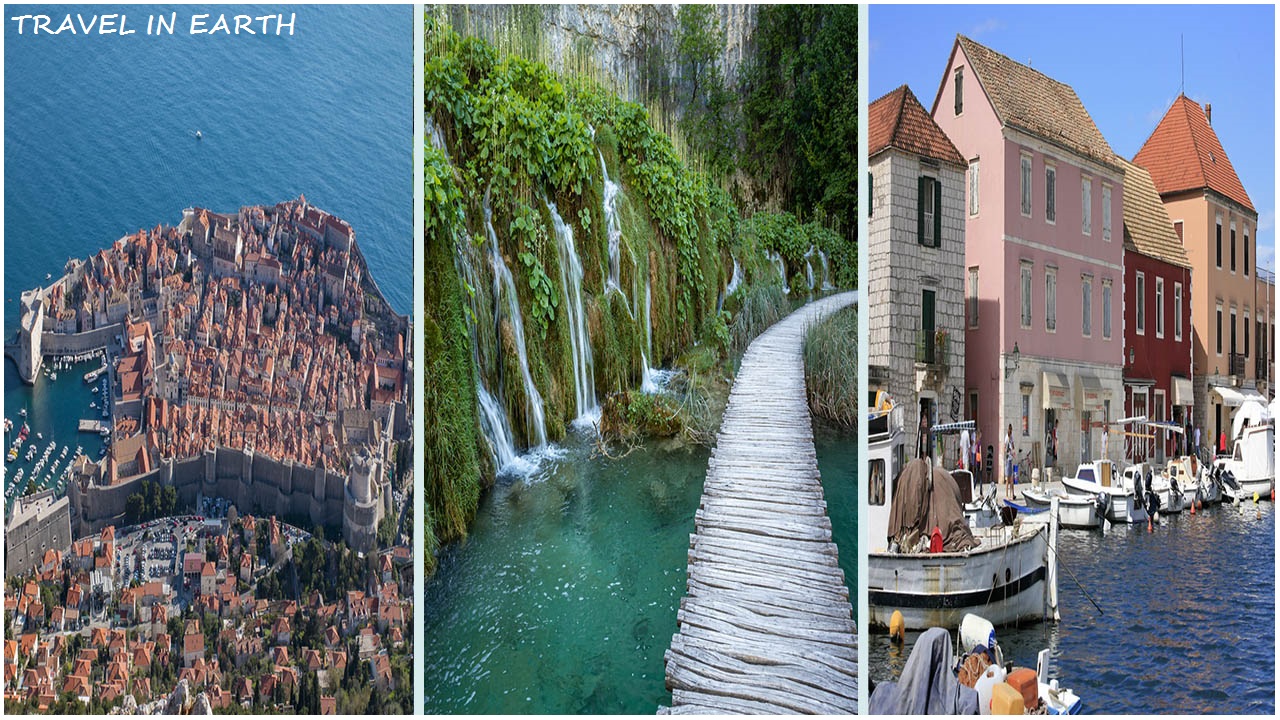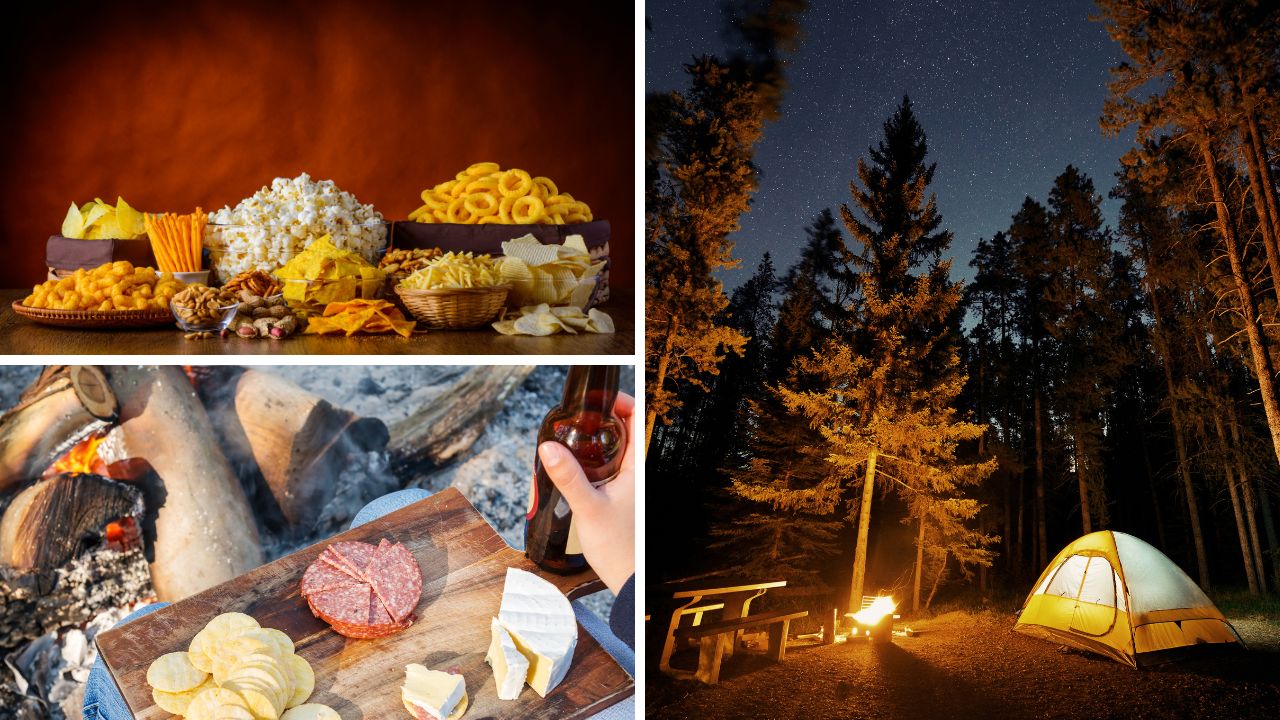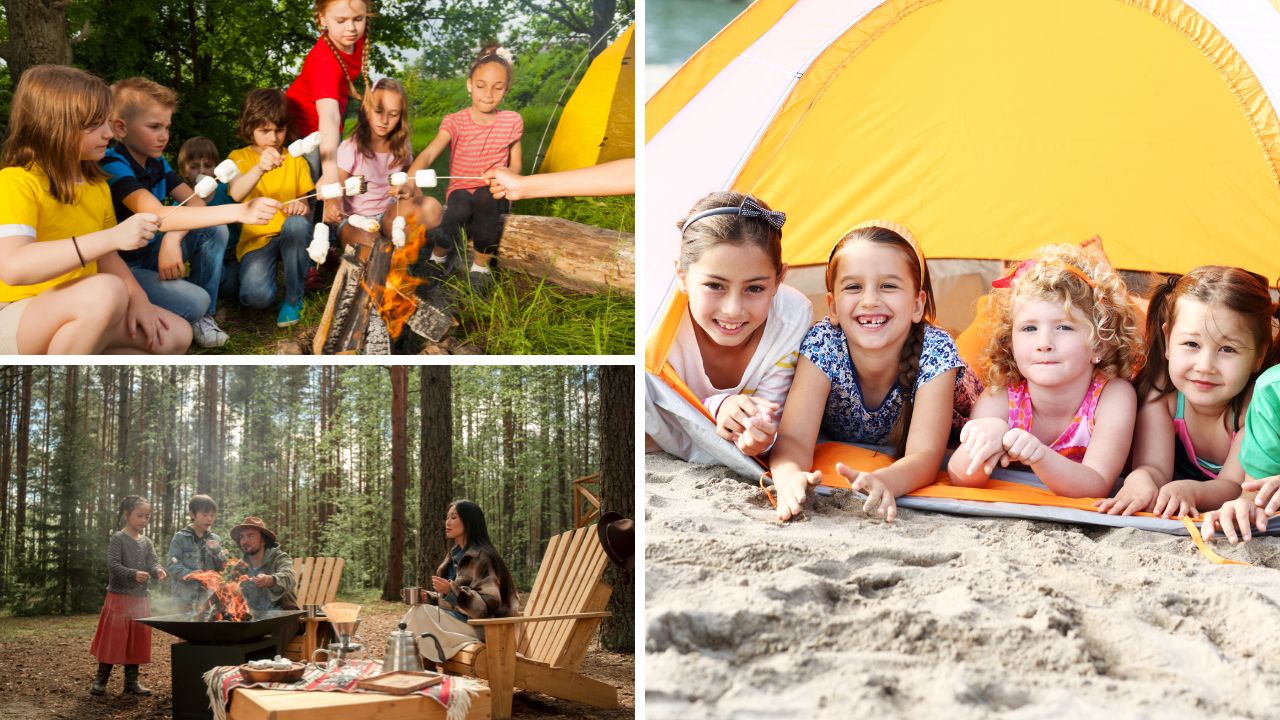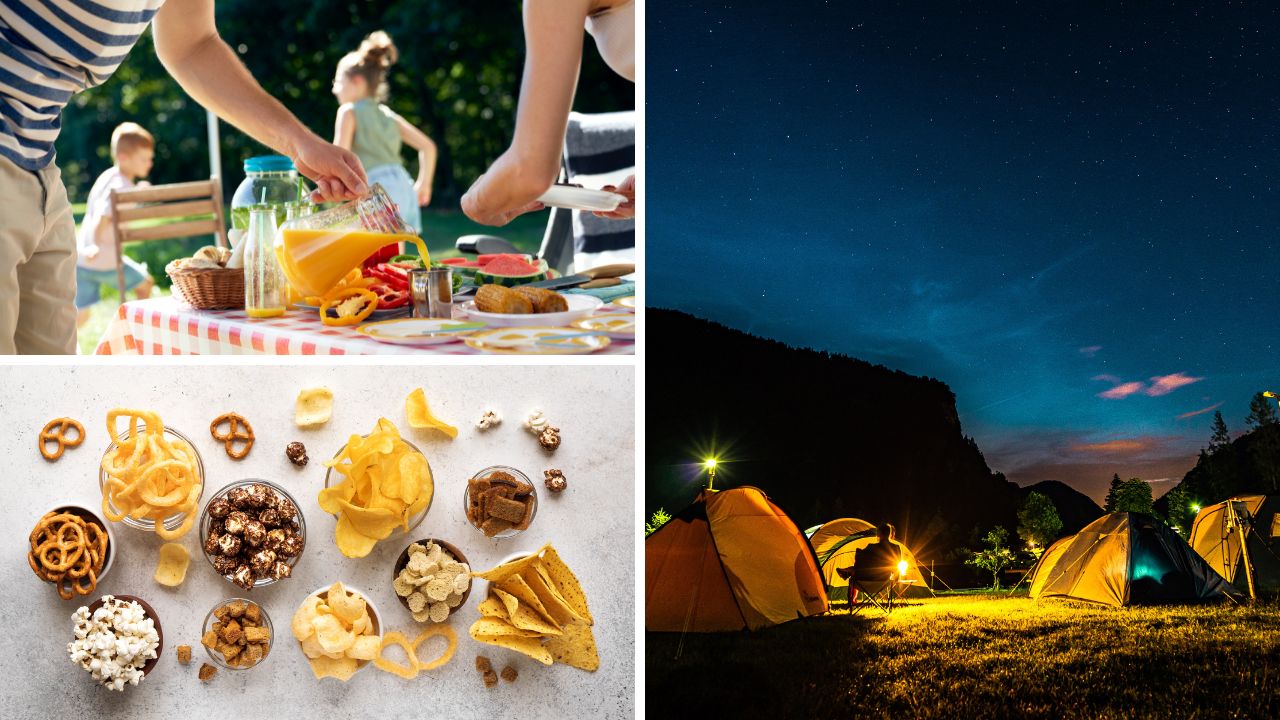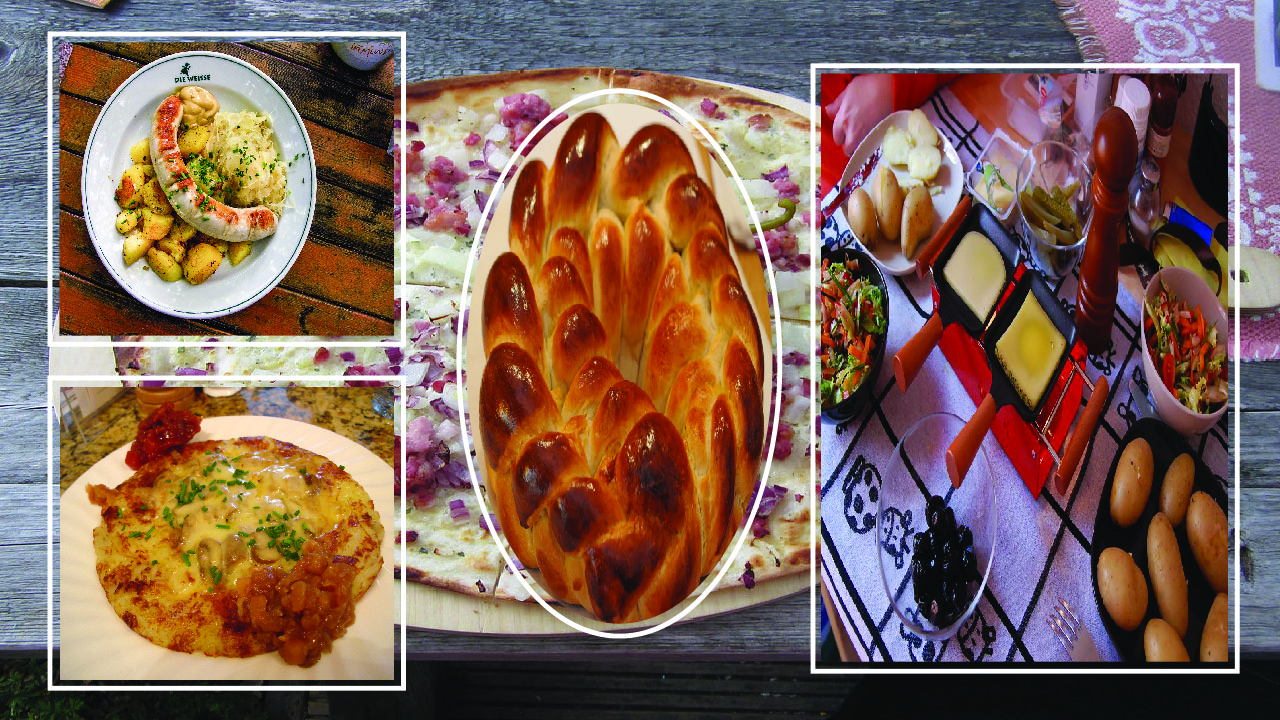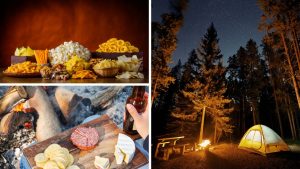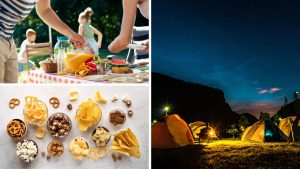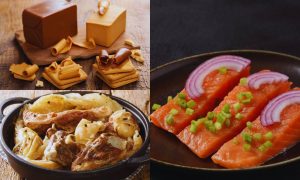Camping with kids is an adventure filled with opportunities for exploration, bonding, and creating lasting memories. However, keeping young campers happy, energized, and well-fed can be a challenge, especially when you’re away from the conveniences of home.
That’s where the right snacks come in. In this comprehensive guide, we’ll explore 30 of the best camping snacks for kids, providing you with a variety of quick, easy, and nutritious options perfect for outdoor adventures.
1. Trail Mix

Trail mix is a quintessential camping snack, beloved by both kids and adults for its tasty combination of flavors and textures.
Ingredients:
- 1 cup of almonds
- 1 cup of cashews
- 1 cup of peanuts
- 1 cup of raisins
- 1 cup dried strawberries
- 1 cup dried apples, chopped
- 1 cup of pumpkin seeds
- 1 cup of sunflower seeds
- Take one cup of dark chocolate chips or M&Ms.
Nutritional Benefits:
- Nuts provide healthy fats, protein, and fiber.
- Dried fruits offer natural sugars for quick energy, plus vitamins and minerals.
- Seeds add extra protein, healthy fats, and minerals like zinc and magnesium.
- Dark chocolate (in moderation) provides antioxidants and a mood boost.
Why it’s great for camping: Trail mix is the ultimate energy food for outdoor activities. It’s lightweight, doesn’t need refrigeration, and provides a good balance of macronutrients. The combination of nuts, seeds, and dried fruits offers both quick energy from natural sugars and sustained energy from proteins and healthy fats.
Preparation Tips:
- Mix all ingredients in a large bowl.
- Store in airtight containers or resealable bags.
- For individual portions, divide into small snack-sized bags.
Camping Hack: Let kids create their own mix before the trip. This can be a fun pre-camping activity and ensures each child has a mix they’ll enjoy.
Allergen Note: Be aware of nut allergies. You can easily create nut-free versions using just seeds and dried fruits.
2. Apple Slices with Peanut Butter
This classic combination of crisp apples and creamy peanut butter is a nutritious and satisfying snack that kids love.
Ingredients:
- Select 4 medium apples, preferably a crisp variety such as Honeycrisp or Granny Smith.
- 1 cup peanut butter
- 1 lemon (optional, for preventing browning)
Nutritional Benefits:
- Apples are rich in fiber, vitamin C, and antioxidants.
- Peanut butter provides protein, healthy fats, and vitamin E.
- The combination offers a good balance of carbohydrates, fats, and protein.
Why it’s great for camping: This snack combines the freshness of fruit with the protein and healthy fats of peanut butter, providing a great energy boost. Apples are also hydrating, which is beneficial during outdoor activities.
Preparation Tips:
- Wash and slice apples into wedges.
- If preparing in advance, toss apple slices with a bit of lemon juice to prevent browning.
- Pack peanut butter in a small, sealable container.
Camping Hack: Pre-portion peanut butter into small containers or purchase single-serve peanut butter packets for easy distribution.
Allergen Note: For nut allergies, substitute peanut butter with sunflower seed butter or another nut-free alternative.
3. Granola Bars

Granola bars are a convenient, pre-packaged option that’s perfect for on-the-go snacking during camping trips.
Store-bought Option: Look for bars with whole grains, minimal added sugars, and recognizable ingredients.
Homemade Recipe:
- 2 cups rolled oats.
- 1/2 cup chopped nuts (almonds, walnuts, or pecans)
- 1/4 cup seeds (pumpkin or sunflower)
- 1/4 cup honey
- 1/4 cup coconut oil
- 1 tsp. vanilla extract
- 1/4 cup dried fruit (raisins, cranberries, or chopped apricots)
- 1/4 cup mini chocolate chips (optional)
Nutritional Benefits:
- Oats provide complex carbohydrates and fiber.
- Nuts and seeds offer protein and healthy fats.
- Dried fruit adds natural sweetness and some vitamins.
Why it’s great for camping: Granola bars are individually wrapped, making them easy to distribute. They provide quick energy from grains and natural sugars, making them perfect for hiking or other outdoor activities.
Preparation Tips (for homemade bars):
- Preheat oven to 350°F (175°C).
- Mix oats, nuts, and seeds in a bowl.
- Heat honey and coconut oil until melted, then stir in vanilla.
- Combine wet and dry ingredients, then mix in dried fruit and chocolate chips.
- Press into a lined baking pan and bake for 20–25 minutes.
- Cool completely before cutting into bars.
Camping Hack: Wrap individual bars in parchment paper or wax paper for easy transport.
Allergen Note: When making homemade bars, you can easily adjust ingredients to avoid common allergens like nuts or gluten.
4. Cheese Sticks
Individually wrapped cheese sticks are a good source of protein and calcium, making them an excellent snack for growing kids.
Nutritional Benefits:
- It is rich in protein, aiding in the construction and restoration of tissues.
- Excellent source of calcium for strong bones and teeth.
- Contains vitamins A and B12.
Why it’s great for camping: Cheese sticks are conveniently portioned and easy to pack. They provide a good dose of protein, which can help keep kids feeling full and energized during outdoor activities.
Preparation Tips:
- Purchase individually wrapped cheese sticks for easy distribution.
- Pack in a cooler with ice packs to keep fresh.
Camping Hack: Freeze cheese sticks before your trip. You can use them to keep other foods cold and thaw them for snack time.
Allergen Note: For those with dairy allergies or lactose intolerance, consider bringing individually wrapped non-dairy cheese alternatives.
5. Dried Fruit
Dried fruits like raisins, apricots, mangoes, and cranberries are sweet treats that don’t need refrigeration.
Nutritional Benefits:
- This concentrated source of natural sugars provides rapid energy.
- Retain much of the fiber and nutrients of fresh fruit.
- Depending on the fruit, it can be a good source of various vitamins and minerals.
Why it’s great for camping: Dried fruit is lightweight, doesn’t need refrigeration, and provides a quick energy boost. It’s also a convenient way to incorporate fruit into your camping diet.
Preparation Tips:
- Purchase pre-packaged dried fruits or dry your own at home.
- Portion into small, resealable bags for easy distribution.
Camping Hack: Mix different types of dried fruits to create a custom “fruit salad” mix.
Allergen Note: Most dried fruits are allergen-free, but always check labels for potential cross-contamination if allergies are a concern.
6. Popcorn

You can prepare popcorn in various flavors and enjoy it as a light, crunchy snack.
Ingredients (for homemade flavored popcorn):
- 8 cups of air-popped popcorn
- Add 2 tablespoons of melted butter or olive oil.
- Add your preferred seasonings, such as cinnamon sugar, cheese powder, or herbs.
Nutritional Benefits:
- Whole grain food high in fiber
- Low in calories when air-popped
- Contains antioxidants and some B vitamins
Why it’s great for camping: Popcorn is very portable, satisfying to munch on, and can be flavored in many ways to suit different tastes.
Preparation Tips:
- Air-pop popcorn at home before your trip.
- Toss with melted butter or oil and your choice of seasonings.
- Allow to cool completely before storing in airtight containers or bags.
Camping Hack: Bring along small shaker bottles with different seasonings to allow kids to flavor their own popcorn at the campsite.
Allergen Note: Plain popcorn is generally allergen-free, but be cautious with added flavorings if allergies are a concern.
7. Beef Jerky
Beef jerky is a protein-rich snack that doesn’t need refrigeration, making it ideal for camping trips.
Nutritional Benefits:
- It is rich in protein, aiding in the upkeep and restoration of bodily tissues.
- Contains iron, zinc, and vitamin B12.
- Low in carbohydrates
Why it’s great for camping: Jerky is lightweight, doesn’t require refrigeration, and provides a substantial amount of protein. It’s a savory option that can help kids feel full and satisfied.
Preparation Tips:
- Look for low-sodium options when purchasing.
- For homemade jerky, slice lean beef thinly, marinate, and dry in a food dehydrator or oven.
Camping Hack: Cut jerky into smaller pieces before the trip for easier eating, especially for younger children.
Allergen Note: Most jerky is gluten-free and dairy-free, but always check labels. For those who don’t eat beef, turkey or plant-based jerky are good alternatives.
8. Fruit Leather
Fruit leather is a chewy, sweet snack made from pureed fruits, offering a fun way to enjoy fruit in a concentrated form.
Homemade Recipe:
- 4 cups of fresh fruit (berries, apples, or stone fruits work well) are recommended.
- Add 2-3 tbsp of honey or maple syrup (optional).
Nutritional Benefits:
- Contains concentrated fruit nutrients and fiber
- Provides natural sugars for quick energy
- Depending on the fruits used, they can serve as a valuable source of vitamins A and C.
Why it’s great for camping: Fruit leather is lightweight, doesn’t need refrigeration, and offers a sweet treat without added refined sugars. It’s also a fun way to get some fruit into kids’ diets during outdoor adventures.
Preparation Tips:
- Puree the fruit in a blender, adding honey if desired.
- Spread thinly on a lined baking sheet.
- Dry in a food dehydrator or in an oven at its lowest setting for 6–8 hours.
- Cut into strips and roll in parchment paper.
Camping Hack: Make different flavors and let kids trade them like trading cards.
Allergen Note: Most fruit leathers are allergen-free, but check labels on store-bought versions for any additives.
9. Veggie Sticks with Hummus

Cut vegetables such as carrots, celery, and bell peppers combined with hummus provide a nutritious and crunchy snack.
Ingredients:
- Assorted cut vegetables (carrots, celery, bell peppers, cucumber)
- Store-bought or homemade hummus
Nutritional Benefits:
- Vegetables provide various vitamins, minerals, and fiber.
- Hummus offers protein, healthy fats, and additional fiber.
- It is low in calories but high in nutrients.
Why it’s great for camping: This snack combines the freshness of raw vegetables with the protein and flavor of hummus, providing a balanced and satisfying option. It’s a great way to incorporate vegetables into your camping menu.
Preparation Tips:
- Wash and cut vegetables into sticks before your trip.
- Store cut veggies in a container with a little water to keep them crisp.
- Pack hummus in a separate, sealed container.
Camping Hack: Use individual hummus cups for easy serving and to avoid the need for utensils.
Allergen Note: Hummus is typically gluten-free but contains sesame. For sesame allergies, consider alternative dips like guacamole or yogurt-based dips.
10. Nut Butter Packets
Individual packets of peanut butter, almond butter, or other nut butters are convenient for camping and hiking.
Nutritional Benefits:
- High in protein and healthy fats
- Good source of vitamins E and B
- Contains minerals like magnesium and zinc
Why it’s great for camping: Nut butter packets are portion-controlled, easy to pack, and don’t require refrigeration. They provide a good balance of protein and healthy fats for sustained energy.
Preparation Tips:
- Purchase individual squeeze packets of nut butter.
- Pair with apple slices, banana, or whole grain crackers.
Camping Hack: Use nut butter packets as a protein boost in oatmeal or spread on wraps for a quick lunch option.
Allergen Note: For nut allergies, look for sunflower seed butter or other seed butter alternatives.
11. Pretzels
Pretzels are a crunchy, salty snack that’s simple to pack and enjoyable for kids.
Nutritional Benefits:
- Low in fat.
- Provide some carbohydrates for energy.
- Iron and B vitamins are frequently added to it.
Why it’s great for camping: Pretzels are lightweight, don’t crumble easily, and satisfy the craving for a salty snack. You can also pair them with other foods due to their versatility.
Preparation Tips:
- Choose whole grain pretzels for added nutrition.
- Pack in a sealed container or bag to maintain freshness.
Camping Hack: Bring along individual portions of peanut butter or cheese spread for dipping.
Allergen Note: Most pretzels contain wheat and sometimes milk. Look for gluten-free options if needed.
12. Energy Bites

These no-bake snacks are easy to make at home and pack well for camping trips.
Recipe:
- 1 cup rolled oats
- 1/2 cup nut butter
- 1/3 cup honey
- 1/4 cup mini chocolate chips
- 1/4 cup ground flaxseed
- 1 tsp vanilla extract
Nutritional Benefits:
- Oats provide complex carbohydrates and fiber.
- Nut butter adds protein and healthy fats.
- Flaxseed offers omega-3 fatty acids and additional fiber.
Why it’s great for camping: Energy bites are compact, don’t need refrigeration, and provide a good balance of carbs, protein, and healthy fats. They’re perfect for a quick energy boost during hikes or outdoor activities.
Preparation Tips:
- Mix all ingredients in a bowl.
- Roll into small balls.
- Refrigerate for at least an hour before packing.
Camping Hack: Roll energy bites in coconut flakes, crushed nuts, or cocoa powder for variety and to prevent them from sticking together.
Allergen Note: This recipe is easily adaptable for allergies; use seed butter instead of nut butter and replace oats with quinoa flakes for a gluten-free version.
13. Banana Chips
Banana chips are a sweet, crunchy alternative to fresh bananas that hold up well on camping trips.
Nutritional Benefits:
- Good source of potassium
- Provides dietary fiber
- Contains vitamin B6 and magnesium
Why it’s great for camping: Banana chips are lightweight, don’t bruise like fresh bananas, and provide quick energy from natural sugars. They’re also a familiar flavor that kids enjoy.
Preparation Tips:
- Look for options without added sugars or oils when buying store-bought.
- To make at home, slice bananas thinly and dehydrate in a food dehydrator or low-temperature oven.
Camping Hack: Mix banana chips with nuts and dark chocolate pieces for a tropical trail mix.
Allergen Note: Plain banana chips are typically allergen-free, but always check labels for potential additives.
14. Rice Cakes
Rice cakes are light, crunchy, and easy to pack for camping trips.
Nutritional Benefits:
- Low in calories
- Gluten-free (most varieties)
- Some brands are fortified with vitamins and minerals
Why it’s great for camping: Rice cakes are lightweight, don’t crumble easily, and can be eaten plain or topped with various spreads. They’re a good base for both sweet and savory snacks.
Preparation Tips:
- Choose whole grain varieties for added nutrition.
- Pack in a hard container to prevent crushing.
Camping Hack: Bring along individual packets of nut butter or cream cheese for easy, mess-free toppings.
Allergen Note: Most rice cakes are gluten-free and allergen-friendly, but always check labels.
15. Roasted Chickpeas

Roasted chickpeas are a crunchy, protein-rich snack that’s easy to make and pack.
Recipe:
- 2 cans chickpeas, drained and rinsed
- 2 tbsp olive oil
- 1 tsp salt
- Spices of choice (e.g., cumin, paprika, garlic powder)
Nutritional Benefits:
- High in protein and fiber
- Good source of vitamins and minerals, including iron and folate.
- Contains complex carbohydrates for sustained energy
Why it’s great for camping: Roasted chickpeas are lightweight, don’t need refrigeration, and provide a good dose of protein and fiber. They’re also a great alternative for kids with nut allergies.
Preparation Tips:
- Drain and rinse chickpeas, then dry thoroughly.
- Toss with oil and seasonings.
- Roast at 400°F (200°C) for 20-30 minutes, stirring occasionally, until crispy.
- Allow to cool completely before storing in an airtight container.
Camping Hack: Experiment with different spice blends for variety – try cinnamon and sugar for a sweet version.
Allergen Note: Chickpeas are legumes. Although they are not a common allergen, it is important to be aware of any potential allergies to legumes.
16. Fruit Cups
Individual fruit cups are a convenient way to pack fruit for camping trips.
Nutritional Benefits:
- Provides vitamins and minerals
- Good source of hydration
- Contains natural sugars for quick energy
Why it’s great for camping: Fruit cups don’t need refrigeration until opened, are portion-controlled, and offer a refreshing, sweet snack option. They’re also a good way to ensure kids are getting some fruit in their diet while camping.
Preparation Tips:
- Look for options packed in juice rather than syrup for less added sugar.
- Pack a spoon or fork for easy eating.
Camping Hack: Freeze fruit cups before the trip – they’ll help keep other foods cold and will thaw by snack time.
Allergen Note: Most fruit cups are allergen-free, but always check labels for any additives.
17. Mini Bagels with Cream Cheese
Mini bagels paired with individual cream cheese packets make for a satisfying, familiar snack.
Nutritional Benefits:
- Bagels provide carbohydrates for energy.
- Cream cheese adds protein and calcium.
- Choose whole grain bagels for added fiber.
Why it’s great for camping: This snack is more substantial than many others, making it good for longer hikes or as a light meal. It’s also familiar food that kids enjoy.
Preparation Tips:
- Pack mini bagels in a crush-proof container.
- Bring individually packaged cream cheese for easy spreading and food safety.
Camping Hack: Bring along small packets of jam or honey for a sweet option, or sliced cucumber for added crunch and freshness.
Allergen Note: Bagels typically contain gluten, and cream cheese contains dairy. Look for gluten-free bagels and dairy-free spread alternatives if needed.
18. Seaweed Snacks

Roasted seaweed snacks are light, crispy, and offer a unique flavor that adventurous eaters might enjoy.
Nutritional Benefits:
- Rich in iodine, which is important for thyroid function
- Contains vitamins A, C, E, and K.
- Good source of minerals, including iron and calcium
- Very low in calories
Why it’s great for camping: Seaweed snacks are incredibly lightweight and compact, making them easy to pack. They offer a different flavor profile from most snacks, adding variety to your camping menu.
Preparation Tips:
- Purchase individually wrapped packs to maintain freshness.
- Store in a hard container to prevent crushing.
Camping Hack: Use as a topping for rice cakes or crackers to add flavor and nutrients.
Allergen Note: Seaweed snacks are typically allergen-free, but always check labels for any additives.
19. Frozen Yogurt Tubes
Frozen yogurt tubes can serve as both a snack and a way to keep other foods cool.
Nutritional Benefits:
- Good source of protein and calcium
- Contains probiotics for gut health
- Provides some vitamins and minerals
Why it’s great for camping: As they thaw, frozen yogurt tubes turn into a refreshing drink. They’re portion-controlled and less messy than regular yogurt cups.
Preparation Tips:
- Freeze yogurt tubes before your trip.
- Pack in a cooler or insulated bag.
Camping Hack: Use frozen yogurt tubes as ice packs in your cooler. They’ll keep other foods cold and be ready to eat when they thaw.
Allergen Note: Contains dairy. Look for dairy-free frozen dessert alternatives if needed.
20. Cereal

Dry cereal in individual containers or bags makes for an easy snack or quick breakfast option.
Nutritional Benefits:
- Provides carbohydrates for energy
- Many cereals are fortified with vitamins and minerals.
- Whole grain options offer fiber.
Why it’s great for camping: Cereal is familiar to kids, easy to pack, and doesn’t require any preparation. It can be eaten dry as a snack or with milk for breakfast.
Preparation Tips:
- Choose whole grain cereals with minimal added sugar.
- Pack in individual portions in small containers or resealable bags.
Camping Hack: Bring along small boxes of shelf-stable milk for breakfast, or mix cereal with dried fruits and nuts for a custom trail mix.
Allergen Note: Many cereals contain wheat or other allergens. Always check labels and choose accordingly.
21. Hard-Boiled Eggs
Hard-boiled eggs are a protein-packed snack that’s easy to prepare and carry.
Nutritional Benefits:
- Excellent source of protein
- Contains vitamins A, D, E, and B12.
- Good source of choline, important for brain health
Why it’s great for camping: Hard-boiled eggs are filling, nutritious, and easy to eat. They provide a good dose of protein, which is important for active kids.
Preparation Tips:
- Boil eggs before your trip and keep them in their shells until ready to eat.
- Store in a hard container to prevent crushing.
Camping Hack: Peel eggs before the trip and store in a container with a little water to prevent drying out.
Allergen Note: Eggs are a common allergen. Be aware of any egg allergies in your group.
22. Fruit Skewers
Thread chunks of fruit onto skewers for a fun, fresh snack.
Ingredients:
- Various fruits (e.g., grapes, strawberries, melon chunks, pineapple)
- Wooden or reusable skewers
Nutritional Benefits:
- Provides a variety of vitamins and minerals
- Good source of fiber
- Contains natural sugars for energy
Why it’s great for camping: Fruit skewers are a playful way to eat fruit. The variety of colors makes them visually appealing, which can encourage kids to eat more fruit.
Preparation Tips:
- Choose firmer fruits that won’t get mushy.
- If preparing in advance, brush cut fruits with a little lemon juice to prevent browning.
- Pack in a hard container to prevent crushing.
Camping Hack: Bring along a small container of yogurt or nut butter for dipping.
Allergen Note: Most fruits are allergen-free, but be aware of any specific fruit allergies in your group.
23. Veggie Chips

Veggie chips made from beetroot, sweet potato, or kale are a healthier alternative to potato chips.
Nutritional Benefits:
- Contains more vitamins and minerals than regular potato chips
- Can be a good source of fiber
- Lower in calories than many other chip varieties
Why it’s great for camping: Veggie chips satisfy the craving for a crunchy, salty snack while providing some additional nutrients. They’re lightweight and easy to pack.
Preparation Tips:
- Look for brands with minimal added oils and salt.
- Store in a hard container to prevent crushing.
Camping Hack: Mix different types of veggie chips for a colorful, varied snack.
Allergen Note: Most veggie chips are allergen-free, but always check labels for any additives or processing information.
24. Snap Peas
Fresh snap peas are a crunchy, sweet vegetable that many kids enjoy.
Nutritional Benefits:
- High in vitamins C and K
- Good source of fiber
- Contains some protein
Why it’s great for camping: Snap peas are easy to eat with no preparation needed. They provide a fresh, crunchy element to your camping snacks.
Preparation Tips:
- Wash peas before the trip.
- Store in a container with a damp paper towel to keep them fresh.
Camping Hack: Bring along individual hummus cups for dipping.
Allergen Note: Snap peas are generally allergen-free, but those with legume allergies should be cautious.
25. Pita Chips and Salsa
Pita chips paired with single-serve salsa containers make a tasty, savory snack.
Nutritional Benefits:
- Whole grain pita chips provide fiber.
- Salsa offers vitamins from vegetables.
- Low-fat snack option
Why it’s great for camping: This combination provides a good mix of carbs and vegetables. The act of dipping makes it a fun, interactive snack for kids.
Preparation Tips:
- Choose whole grain pita chips for added nutrition.
- Opt for single-serve salsa containers to avoid the need for refrigeration after opening.
Camping Hack: Bring along single-serve guacamole cups for another dipping option.
Allergen Note: Pita chips typically contain wheat. Look for gluten-free options if needed.
26. Squeezable Applesauce

Applesauce in squeezable pouches is a mess-free way to enjoy fruit.
Nutritional Benefits:
- Good source of vitamin C
- Provides some fiber
- Contains natural fruit sugars for energy.
Why it’s great for camping: Squeezable applesauce is easy to eat without utensils, making it ideal for on-the-go snacking during hikes or other activities.
Preparation Tips:
- Look for options without added sugars.
- No refrigeration is needed until opened.
Camping Hack: Freeze pouches before the trip for a slushy-like treat on warm days.
Allergen Note: Plain applesauce is typically allergen-free, but always check labels for any additives.
27. Chia Seed Pudding
Chia seed pudding is a nutritious snack that can be prepared in advance.
Recipe:
- 1/4 cup chia seeds
- 1 cup milk (dairy or plant-based)
- 1 tbsp honey or maple syrup
- 1/4 tsp vanilla extract
- Fruit for topping (optional)
Nutritional Benefits:
- Chia seeds are high in omega-3 fatty acids, protein, and fiber.
- Good source of calcium and iron
- Provides sustained energy
Why it’s great for camping: Chia seed pudding is filling and nutritious. It can serve as a snack or a breakfast option.
Preparation Tips:
- Mix all ingredients except fruit in a jar or container.
- Refrigerate overnight or for at least 4 hours before your trip.
- Top with fresh or dried fruit before serving.
Camping Hack: Prepare in small, individual containers for easy serving.
Allergen Note: Chia seeds are generally allergen-free, but be mindful of the type of milk used.
28. Roasted Pumpkin Seeds
Roasted pumpkin seeds are a crunchy, nutritious snack.
Recipe:
- 2 cups raw pumpkin seeds
- 1 tbsp olive oil
- 1 tsp salt
- Spices of choice (e.g., garlic powder, cumin, cinnamon)
Nutritional Benefits:
- High in minerals like zinc and magnesium
- Good source of protein and healthy fats
- Contains fiber
Why it’s great for camping: Roasted pumpkin seeds are lightweight, don’t need refrigeration, and provide a good balance of nutrients.
Preparation Tips:
- Toss seeds with oil and seasonings.
- Roast at 325°F (165°C) for about 45 minutes, stirring occasionally.
- Allow to cool completely before storing in an airtight container.
Camping Hack: Experiment with different spice blends for variety.
Allergen Note: Pumpkin seeds are generally allergen-free, but always check labels if purchasing pre-roasted seeds.
29. Fruit and Nut Bars
Fruit and nut bars are a convenient, packaged option for quick energy.
Nutritional Benefits:
- It offers a combination of carbohydrates, protein, and healthy fats.
- A good source of fiber.
- It contains various vitamins and minerals from fruits and nuts.
Why it’s great for camping: These bars are compact, don’t need refrigeration, and offer a good balance of nutrients for sustained energy.
Preparation Tips:
- Look for bars with minimal added sugars and recognizable ingredients.
- Choose bars with a good balance of fruit and nuts.
Camping Hack: Cut larger bars into smaller pieces for portion control and easier snacking.
Allergen Note: Many fruit and nut bars contain common allergens like nuts and sometimes dairy or soy. Always check labels.
30. Whole Grain Crackers with Cheese

Whole grain crackers paired with individually wrapped cheese make a satisfying snack.
Nutritional Benefits:
- Crackers provide complex carbohydrates and fiber.
- Cheese offers protein and calcium.
- Good source of energy
Why it’s great for camping: This combination provides a good balance of carbs and protein. It’s also a familiar snack that many kids enjoy.
Preparation Tips:
- Pack crackers in a hard container to prevent crushing.
- Bring individually wrapped cheese for food safety and easy distribution.
Camping Hack: Pack a variety of cheese options for different flavors and to cater to different preferences.
Allergen Note: Crackers often contain wheat, and cheese contains dairy. Look for gluten-free crackers and non-dairy cheese alternatives if needed.
Conclusion
Packing the right snacks can make a big difference in your camping trip with kids. These 30 options provide a mix of store-bought convenience and homemade treats, covering a range of nutritional needs from quick energy boosts to protein-rich options for lasting fullness.

